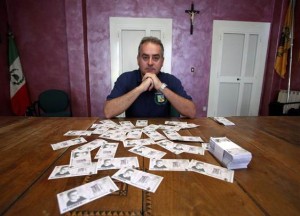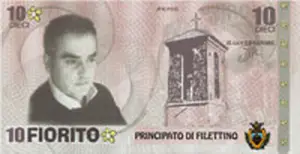
The man who would be king? Mayor Luca Sellari displays Filettino's own bank currency, the "Fiorito," which features his face, at his office in the town.
By David Willey – BBC News Rome
A small town in central Italy has declared its independence and started to print its own banknotes.
The authorities in Filettino, 100km (70 miles) east of Rome, are protesting against austerity measures.
It has only 550 inhabitants and under new rules aimed at cutting local administration costs it will be forced to merge with neighbouring Trevi.
Town mayor Luca Sellari, who stands to lose his job because of the eurozone crisis, came up with the idea.
He created his own currency, called the Fiorito. Banknotes have his head on the back, and they are already being used in local shops and being bought as souvenirs by tourists who have started to throng the normally quiet streets.
The mayor says there is enormous enthusiasm about declaring the independence of the new principality.
[pro_ad_display_adzone id=”110028″]
There has been such an outcry by small towns across Italy at the government move to abolish local councils and merge them with larger towns that Prime Minister Silvio Berlusconi’s coalition may be forced to backtrack.
In the meantime the new Principality of Filettino – complete with coat of arms and website – is suddenly enjoying international fame.
TV stations from as far afield as Russia have been running news features about Filettino.
After all, the mayor says, Italy was once made up of dozens of principalities and dukedoms. As he says, the landlocked republic of San Marino still manages to survive, so why not Filettino?
[ad code=2 align=center]
In an Italian Town, Dreams of Freedom On a Princely Scale
 By Elisabetta Povoledo – nytimes.com
By Elisabetta Povoledo – nytimes.com
Evoking the history of Italy, a nation forged from countless city-states protective of their local traditions, dialects and diversity, some of the mayors of the 1,963 towns affected by the measure turned in the honorary keys to their cities in protest. Others said they would welcome immigrants escaping war-torn Libya to push their populations over the 1,000-person threshold.
The mayor of Filettino has loftier aspirations: He wants his town in the hills east of Rome — population 598 — to become an independent state under a monarch.
“If that’s what it takes to keep the town autonomous and protect its natural resources,” said the mayor, Luca Sellari, who was elected in May. Besides, he added, “It’s everyone’s dream to be a prince.”
As befits a monarch, Mr. Sellari has lost little time in pursuing his dream. The would-be principality already has a coat of arms that now graces everything from T-shirts (“going like hotcakes,” Mr. Sellari said) to a liqueur, the Amaro of the Principality, which a local bartender, Maria Cerrocchi, said was just a brand-name bottle “with a photocopied label stuck on it.”
Filettino has even printed its own currency, the fiorito, which means “flowered” (“like the town will flower in its new guise,” the mayor explained) and which harks back to the florin, the money first coined in 13th-century Florence. If fioritos become legal tender (so far they are just souvenirs), the exchange rate is supposed to be set at two to the euro, or about 72 cents apiece.
“See, we’ve resolved the public debt issue,” said Enio Marfoli, who is Filettino’s part-time councilor for culture and a full-time oboist who plans to write the national anthem. Mr. Marfoli said he was already doing his part to help the Italian state trim administrative expenses: as councilor, he works for free. “It’s basically volunteer work,” he said.
Across Italy, small-town mayors are angry that the national government chose to cut money for their relatively negligible budgets rather than tackle big, politically sensitive issues like raising the country’s retirement age.
“Do you know how much all the mayors and town councilors in small Italian towns cost the state?” asked Franca Biglio, president of the National Association of Small Towns, known as Anpci. The answer: 5.8 million euros, she said, about the same as what the lower house of Parliament “pays for its restaurant services.”
“We work like crazy, and they want to cut something that costs the same as their kitchen,” she said. “What are they waiting for? A revolution to explode?”
Rebellion was certainly in the air on Monday when hundreds of mayors from cities of all sizes protested in Milan against other measures included in the austerity budget.
Continue reading this story here
[pro_ad_display_adzone id=”110027″]







